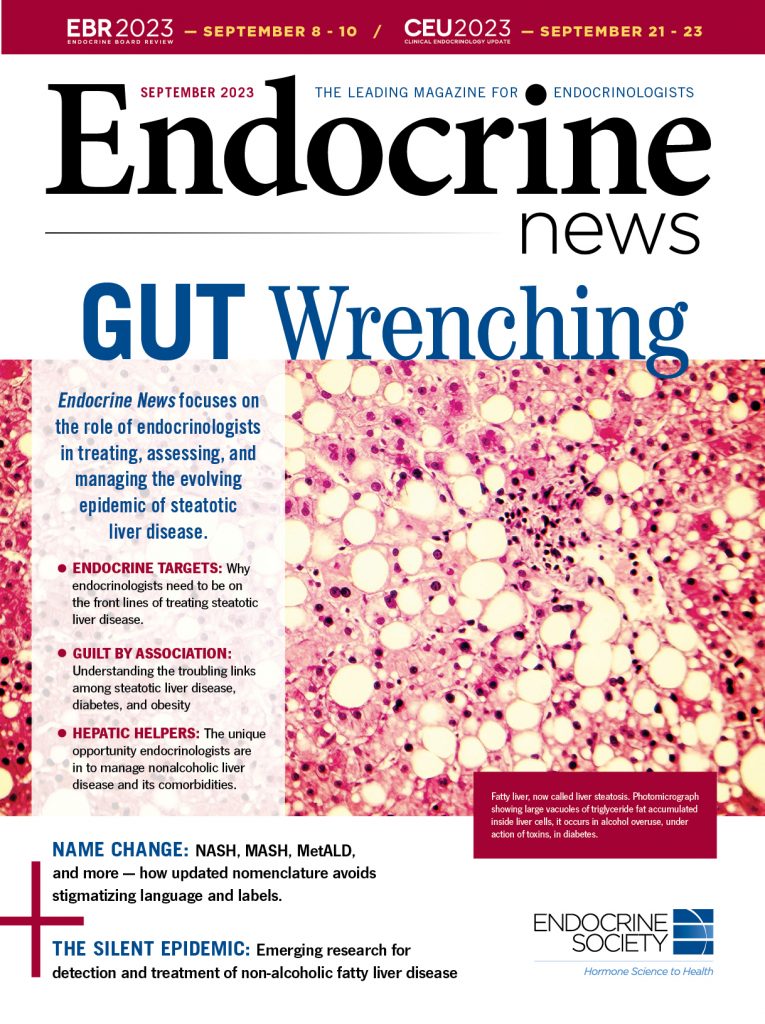
This month’s issue is an unusual one for us as it focuses on a malady that we seldom focus on in Endocrine News, much less devote an entire issue to it: Steatotic liver disease. Since this condition is destined to reach epidemic proportions along with obesity and diabetes, we felt this was a good time to give it a closer look.
In “Hepatic Helpers: Endocrinology in the Age of Heightened Liver Disease,” senior editor Derek Bagley looks at recent studies published in The Journal of Clinical Endocrinology & Metabolism that really highlight the unique opportunity that will be coming endocrinologists’ way in playing a major role in managing nonalcoholic liver disease along with its many comorbidities. As noted in the article, since there are no FDA-approved treatments for liver disease, endocrinologists can step in not only by caring for these patients, but in pursuing relevant research. “We have data that’s unpublished, that shows that people who attend endocrine clinics have twice the rate of people with advanced liver fibrosis and cirrhosis than in primary care,” says Kenneth Cusi, MD, chief, Division of Endocrinology, Diabetes and Metabolism at the University of Florida, Gainesville, Fla., adding that “because of that, we have a greater responsibility of identifying them, so they can be co-managed with hepatology and given a formal diagnosis, and some interventions that can be implemented today.”

Eric Seaborg looks at a multi-session program that was featured at ENDO 2023 in Chicago in “Endocrine Targets: Taking the Lead in Treating Steatotic Liver Disease.” Eric notes in his article that the session was planned in order to raise endocrinologists’ awareness of their potential roles in addressing endocrine targets in steatotic liver disease “and as a reflection of attendees’ interest, the room had to be enlarged to accommodate all those who wished to attend,” he writes. Also included in the piece is a sidebar about the nomenclature adjustment for the various disorders so that the descriptions would be less stigmatizing going forward. Laura E. Dichtel, MD, MHS, of Harvard Medical School and Massachusetts General Hospital, was one of the ENDO 2023 speakers was not involved in these updates, but she says that the “new terminology has already begun to be adopted and will hopefully support advances in research and clinical care by defining steatotic liver disease more precisely.”
In “Guilt by Association: Exploring the Concerning Links Between NASH, MAFLD, Diabetes, and Obesity,” Derek conducts a Q&A with Theodore C. Friedman, MD, PhD, MPH, MS, and Magda Shaheen, MD, PhD, of Charles R. Drew University of Medicine & Science, about research they presented at ENDO 2023 that further details fatty liver disease’s link to diabetes, what impact new medications could have, and their views on how endocrinologists can help stem the tide. According to Friedman, diabetes clearly leads to more liver disease because “the higher the A1c, the more fatty liver disease,” he says, but adds his team performed correlations and he can’t say for certain that the reverse is true that “more severe liver disease leads to more diabetes. I think it’s clear diabetes and pre-diabetes lead to fatty liver disease.”
Please feel free to let us know what you think of this narrowly focused issue highlighting endocrinology’s role in managing and seeking treatments for steatotic liver disease. As always, I welcome your comments and suggestions at: [email protected].

